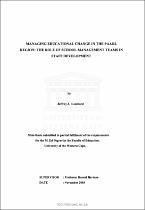| dc.contributor.advisor | Herman, Harold | |
| dc.contributor.author | Lombard, Jeffery J. | |
| dc.date.accessioned | 2023-05-10T07:19:32Z | |
| dc.date.available | 2023-05-10T07:19:32Z | |
| dc.date.issued | 2003 | |
| dc.identifier.uri | http://hdl.handle.net/11394/9876 | |
| dc.description | Magister Educationis - MEd | en_US |
| dc.description.abstract | The objective of this mini-thesis was to investigate the management of educational change in the Paarl region - the role of school management teams (SMTs) in staff development. As leaders or managers, SMTs are regarded as persons that can make a difference in school improvement. They are in authoritative positions to anticipate and manage educational change. They should therefore know how to go about managing change in schools and how to get the rest of their staff involved in this change process. The research study was done at three secondary schools in the Paarl region. Fourteen interviews were conducted with representatives of SMTs of the three schools. The samples included three principals, two vice-principals and three heads of departments. Qualitative research methodology was used to analyse and interpret the data. The techniques for data collection used in this study were semi-structured interviews and
documentary analysis.
Seven themes were used to elicit the scope of the major : findings in this research study
which included:
• Perceptions of staff development;
• Managing school change and the role of the SMT;
• Existing staff development programmes at schools;
• New staff development needs;
• Staff development plans;
• Continuing professional development and training of teachers;
• Nature, certification and remuneration of teachers for staff development
programmes.
The major findings revealed that SMTs do not yet understand their roles and responsibilities in staff development in the schools fully and also how to manage educational change. They still have a major role to play in implementing staff development as a strategy for managing educational change. SMTs at the three schools are currently not well equipped to address some of the major educational changes facing our education system today. They are not to be blamed for this because the expectations of the education authorities are mostly focused on the
implementation of curriculum change and not on how school management teams should handle it. The investigation concluded that staff development is an important tool for SMTs to effectively manage educational change. A key finding is that schools must have a structured staff development plan and a staff development policy to meet the required needs for all teachers to be part of any school improvement efforts.
• SMTs must ensure that managing educational change principles are integrated into the way of life of the school;
• Staff development must be a definite objective for SMTs in managing educational change;
• Staff development must become part of the normal conditions of service of practising teachers;
• Programmes must be set up for staff development with specific objectives and a statement on how it will be achieved; and
• Staff development must be accommodated on schools' timetables. | en_US |
| dc.language.iso | en | en_US |
| dc.publisher | University of the Western Cape | en_US |
| dc.subject | School Management Team | en_US |
| dc.subject | Staff development | en_US |
| dc.subject | Managing educational change | en_US |
| dc.subject | Paarl region | en_US |
| dc.subject | Teachers | en_US |
| dc.title | Managing educational change in the Paarl region: the role of school management teams in staff development | en_US |
| dc.rights.holder | University of the Western Cape | en_US |

